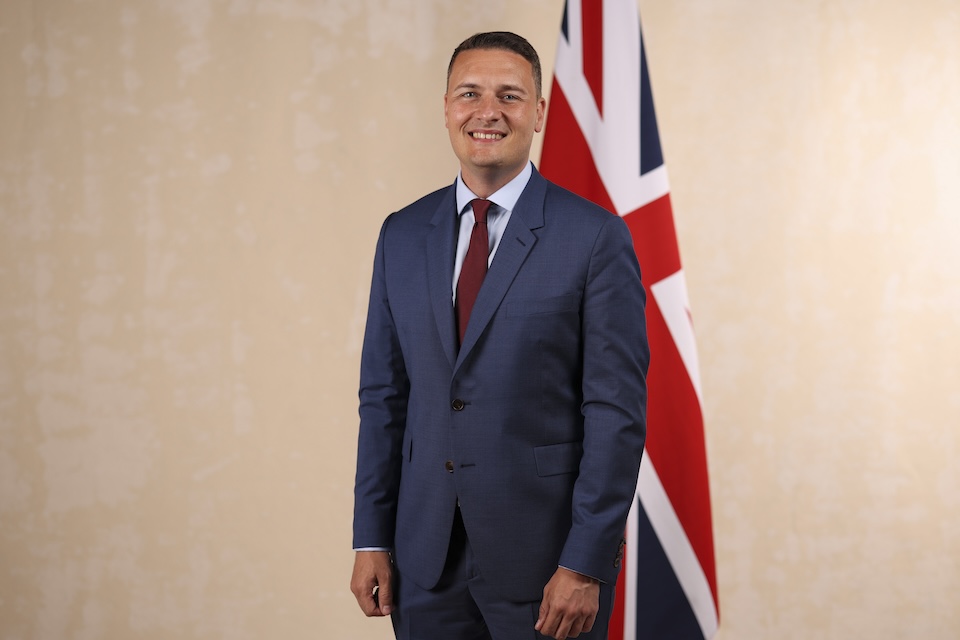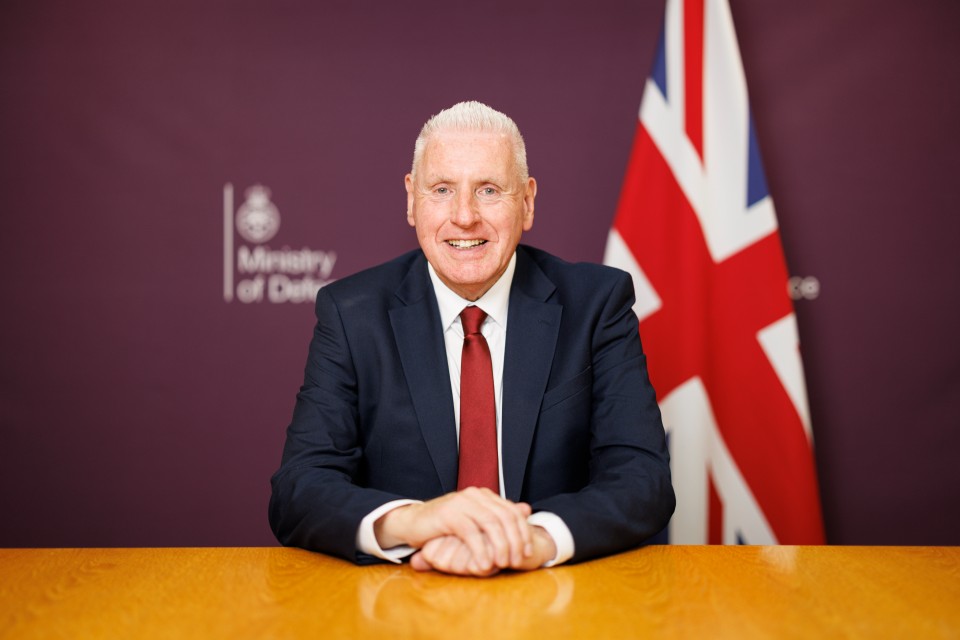I’m really pleased to be with you today, hot on the heels of the Spending Review and just weeks away from the launch of the 10 Year Plan for Health.
Normally when I do a speech like this, there’s a pressure on me from No 10 frankly to deliver some news lines for the government and messages for the general public.
But with the Spending Review still dominating the headlines and filling tomorrow’s column inches, I actually have the luxury of being able to talk to you, the system, and only you.
So, I want to seize this opportunity to have a health geekout, set out what the Spending Review means for us, trail some of the reform agenda in the 10 Year Plan and then spend most of the time we have answering your questions.
I apologise in advance to our friends in the media, who might not be as excited as the rest of us by the prospect of a discussion on the NHS operating model.
Let me begin by thanking you, Matthew, for the leadership you are showing and the ideas you are bringing to the table.
They are critical in shaping the 10 Year Plan and developing a new model of care.
I really enjoyed reading your speech yesterday and I want to rise to the challenges you set for me, as well as the challenge you’ve set your members today.
You were absolutely right to warn in your speech yesterday about the jeopardy facing the NHS.
[Political content has been removed]
The NHS is in a fight for its life, but nothing I have experienced in my first 11 months in office has shaken my conviction or confidence that this is a fight we will win.
Today’s waiting list figures for April are cause for optimism.
For the first time in 17 years, the NHS cut waiting lists in the month of April. At the busiest time of the year for electives, you made real progress, demonstrating our Plan for Change is working.
Since we came to office, we have
• Delivered 3.6 million more appointments than last year
• Diagnosed an extra 187,000 suspected cancer patients within 28 days compared to last year
• And cut waiting lists by almost a quarter of a million
Of course it’s not all about electives.
I was really pleased by the reaction to the Urgent and Emergency Care Plan published last week and you’ll be pleased to know that winter planning for this year is already well underway.
And of all the things we’ve done in the past 11 months, one of the things I’m most proud of is our work with GPs.
It’s not just that we’ve been able to deliver the biggest uplift in funding for years or the satisfaction of seeing a decision I took in my first weeks translate into more than 1,500 GPs employed on the frontline already as a result, it’s actually the fact that we agreed a contract rather than imposing it, committed to further reform together, and it feels like we’re building a real partnership with the profession.
There are lots of other green shoots I could point to, but I think my own sense of optimism was best summed up by one trust Chief Exec who said to me recently, “I can see light at the end of the tunnel and I’m finally convinced it’s not an oncoming train about to hit me!”
There’s a long way to go, but thanks to everything you, we, have already achieved together, I genuinely think the NHS is finally on the road to recovery.
Yesterday’s Spending Review was a vital moment on that journey.
Thanks to the investment made by the Chancellor, the NHS will receive
• £10 billion to bring our analogue NHS into the digital age, with a 50% increase in the NHS technology budget that won’t be raided thanks to Rachel’s fiscal rules
• Thousands more GPs to help build the neighbourhood health service
• Mental health support in every school, to keep kids in school and out of hospital
• The highest ever capital investment, to rebuild our crumbling health service
• And a record cash investment, providing an additional £29 billion a year by 2028/29.
There have been broadly two sorts of reactions to this. The first, mainly from the media and the public – “£29 billion is a hell of a lot of money.”
The second, mainly from our think tank friends – “£29 billion is nowhere near enough.”
The truth is, both are right.
It is objectively a substantial funding settlement that puts wind in our sails.
But investment alone isn’t enough.
As I have consistently argued, there is no fix to the NHS’s problems that simply pours more money into a broken system.
It is only through the combination of investment and reform that we will succeed in getting the NHS back on its feet and making make it fit for the future.
Yesterday, the Chancellor spoke about the 3%.
Today, I want to talk about the 100%.
If you focus on the 3% funding increase, and ask whether it can clear the backlog, improve A&E and ambulance response times, make it easier to see a GP or dentist, and meet all the rising pressures on the health service, the task in front of us looks daunting.
But if instead we look at 100% of the budget the NHS will receive next year, totalling £205 billion, and ask ‘what if we spent that funding where it would make the biggest difference to patients’, then the opportunities before us seem enormous.
There will be a big culture shock.
It won’t be easy – I don’t need to tell you that.
Reimagining the NHS over the next decade demands a mammoth effort from all of us.
So, I want to give you this assurance, as you carry out the difficult tasks I’ve set for you I’ll have your backs.
Matthew yesterday asked for realism and honesty from the government.
Well, here it is. As we deliver the transformational shifts in our 10 Year Plan, from hospital to community, analogue to digital, and sickness to prevention, it will have radical implications for services.
Much of what’s done in a hospital today, will be done on the high street, over the phone, or through the app in a decade’s time.
So if you need to reconfigure services to cut waiting times, modernise, and improve productivity, you will have my support.
In fact I’ve had nine reconfigurations cross my desk since becoming Health Secretary.
Of course I have looked at them thoroughly, assured myself that patient safety and access are guarded, but I haven’t intervened in a single one yet.
This is a team effort and I trust you to deliver.
That is the only way we will succeed.
Politicians and the media often say to me, we agree with you on the need to reform the NHS, but you’ll never get it through the NHS itself.
Well, as we have developed our 10 Year Plan, we have led the biggest national conversation about the future of the NHS in its history.
Two million people have taken part, from patients to senior NHS leaders.
And no one defends the status quo.
There is a consensus across the system itself that the NHS needs change.
But I know that, while you’re up for reform, you are worried that a top-down reorganisation would make it harder to deliver.
So let me assure you all on this too – we are not embarking on another top-down reorganisation.
Changes to the organisation of providers will be evolution, not counter-revolution.
The 2012 Lansley reorganisation created two head offices, with 20,000 staff between them, sitting atop an ever-growing mountain of bodies, diktats, and targets.
The NHS operates as a centralised state bureaucracy, attempting to run an organisation of 1.5 million staff with 50 million users from two central London offices.
It is a product of its time.
Government no longer attempts to control public services or industries from Westminster.
Except when it comes to the NHS.
The experience for you is disempowering and demoralising.
There is no reward for being the best.
Little freedom to be entrepreneurial or innovative.
And those of you who are facing the toughest challenges aren’t getting the support you need to turn things around.
You are too often left looking up to the centre for instruction or, worse still, feeling like you’re being held back.
It stifles your creativity and means the patient voice goes unheard.
With the publication of our 10 Year Plan, we will bring this era of top-down control to an end.
You might think it’s slightly odd to pledge to end the era of soviet-style statism with a 10 Year Plan. You’d have a point.
But this has to be a decade of renewal.
Not just because of the size of the institution and the scale of the challenge.
But also because there is a duty on our generation to raise our sights above the current crisis, look out over the horizon, and prepare the health service to seize the future.
[Political content has been removed]
And what a failure it would be now, if we also failed to make the big changes needed today, to build an NHS fit for tomorrow.
That is the job of the 10 Year Plan. Not just to get the NHS back on its feet, but to prepare it for the world of genomics, artificial intelligence, predictive and preventative medicine.
Some country will lead the charge in these fields. Why shouldn’t it be Britain?
Private healthcare companies will be queueing up to make sure their customers benefit from this revolution.
Why shouldn’t NHS patients be at the front of that queue?
This will require a radical new operating model for the NHS.
Hopefully you have already noticed that change has begun.
This year’s planning guidance almost halved the number of targets you are judged against.
I took some political flak for removing some of those targets, but it was worth it to give you the freedom to deliver.
The NHS mandate gave a clear instruction to get back to basics cutting waiting times for operations, A&E and ambulances; making it easier to see a GP or a dentist; and improving the mental health of the nation.
The new GP contract I mentioned cut 32 targets, and focused on the outcomes that matter most to patients – bringing back the family doctor and ending the 8am scramble.
We are abolishing NHS England, stripping out duplication, cutting headcount by 50%, and using the proceeds to reinvest in the frontline.
Now I wouldn’t be the first politician to tell you they want fewer targets and less central bureaucracy.
But I hope you can see proof points that this government is walking the talk on reform, and there’s plenty more to come.
The 10 Year Plan will build on the start we’ve made.
It will devolve power to the frontline, create a more diverse, continuously improving health service, that delivers better care for patients and better value for taxpayers.
Let me set out the principles of the that new operating model.
First, clarity.
While much of the system today is unclear on its role and purpose, we will provide that clarity.
Priorities will be clear, centrally mandated targets – fewer, and leaders responsible for delivering outcomes.
The centre will continue to shrink, become more agile, and a better partner to you.
The job of the centre will be to drive excellence and use its central procurement muscle to much better effect.
There will still be seven NHS regions, who will manage performance and oversee the providers in their region.
ICBs will be the strategic commissioners of local health services. They will be responsible for improving their population’s health, closing health inequalities, and building the new neighbourhood health service.
Second, consequences for performance.
The NHS was founded on the principle of equality.
Whatever your background and wherever you live, you should receive first class healthcare, based on need not ability to pay.
But the truth is, the NHS has never been truly equal.
Across our country we see a postcode lottery in quality of care.
And the poorest services are often found in the poorest communities.
This is an affront to the values the NHS was built on, the values of my party, and my personal values.
The introduction of foundation trusts was one of the most successful NHS reforms in the last 25 years.
The philosophy behind it holds true – earned autonomy, greater responsibility for boards and the freedom to innovate is still the best way to drive up standards.
This has been lost over the last decade, as the bureaucratic culture of excessive micromanagement took over.
So we will reinvigorate the foundation trust model.
The 10 Year Plan will introduce incentives, freedoms flexibilities, and freedom from central control for local providers delivering a quality service.
Starting with the best performing foundation trusts, we will restore the powers they once enjoyed.
This will be a reinvention of foundation trusts for the modern age.
We will also change the financial rules of the game, as Matthew argued for yesterday, so foundation trusts can only succeed if they collaborate with community and mental health providers and GPs, focus on outcomes not activity, drive the left shift, and help to improve population health.
Where providers are underperforming, we will step in and support you to turn it around.
If services are simply configured wrong, we will empower you to change.
Where there are failures in leadership and culture, the leadership will be replaced, with bonuses to attract our best leaders into our most challenged trusts.
Where there are repeated financial problems, the failing provider may be placed into administration and taken over by another provider.
This will be a decade-long project of improvement, and we will start in working class, rural and coastal communities.
This year, we will require regions to begin drawing up plans for failing providers and begin the process of turnaround.
The third principle is leadership matters.
We will have higher standards for leaders.
Crucially we will nurture and develop a new era of modern NHS leaders, able to lead systems and deliver better outcomes for patients, not just more activity.
Pay will be tied to performance, good work will be rewarded, and so will stepping up to take on the most challenged trusts.
No one part of the NHS has a monopoly on good ideas.
Where providers are delivering excellent care for patients at good value for taxpayers, and where those providers want to widen the pool of patients they care for, then we will encourage it.
The NHS should not be bound by traditional expectations of how services should be arranged.
I am open to our strongest acute trusts providing not just community services, as many already do, but also primary care.
Whatever services will enable them to meet the needs of their patients in a more integrated and efficient way.
Indeed, I would hope these that those old fashioned labels – acute, community – become increasingly meaningless.
Likewise, there is no reason why successful GPs should not be able to run local hospitals, or why nurses should not be leading neighbourhood health services.
And as plans are drawn up for the new neighbourhood health services, I will give our nation’s mayors and local government leaders a seat at the table.
You see every day, in the patients who walk through your doors, the consequences of damp housing, dirty air, and poverty.
It is in the interests of the NHS to work better with local government to deliver the shift from sickness to prevention.
Fourth principle of course, if I’ve learned anything in the last 11 months, money talks.
We will use financial incentives to invest more in public health outcomes, not just in more activity that reacts to sickness.
Resources will be tied to outcome-based targets, which all commissioners and providers will have a responsibility to help meet.
New financial flows will drive resources from hospitals to the community.
Financial management is back, as I know you all have been grappling with in the past few months.
Jim Mackey is ending the culture where deficits were treated like a fact of life. And I know that’s hard.
There is no answer to the waiting times crisis that doesn’t deal with the productivity crisis, and that means leaders have to be in the business of getting the best bang for the taxpayers’ buck.
More best practice tariffs will force outdated practices to be ruthlessly binned.
The final principle is the most important one of all as far as I’m concerned the patient is king.
When the NHS was founded, Nye Bevan promised, in a speech to the Institute of Hospital Administrators, that it would hold up a ‘public megaphone’ to the mouths of patients.
Today, power in the health service could not be further away from its patients.
So when I talk about radical devolution, it will go all the way down to the patient.
Jim talked yesterday of his determination to stop central prescription of inputs, and focus instead on outcomes.
I couldn’t agree more.
For it to really work, there has to be transparency of quality, outcomes, and patient experience at every level.
Before I take your questions and feedback, I just want to end on this note of optimism.
Nothing I have seen or experienced in my first 11 months as your Secretary of State has shaken my confidence or conviction that we can succeed in doing something truly remarkable for our country.
We can be the team that took the NHS from the worst crisis in its history, got it back on its feet and made it fit for the future.
I honestly can’t think of anything I’d rather be doing with my life and, having spent a lot of time across the service this year, I couldn’t ask for a better team at my side.
So thank you.







